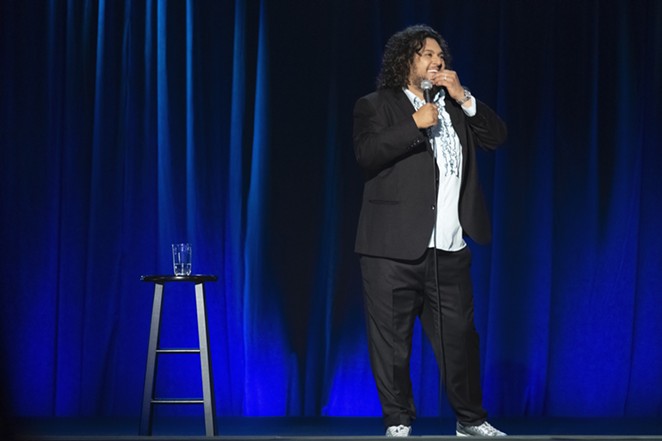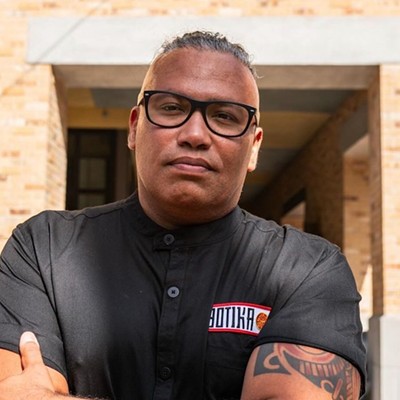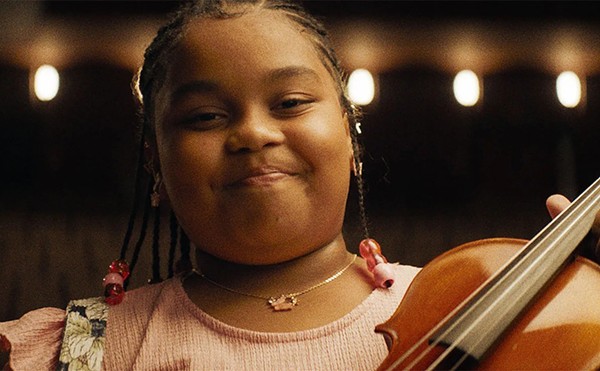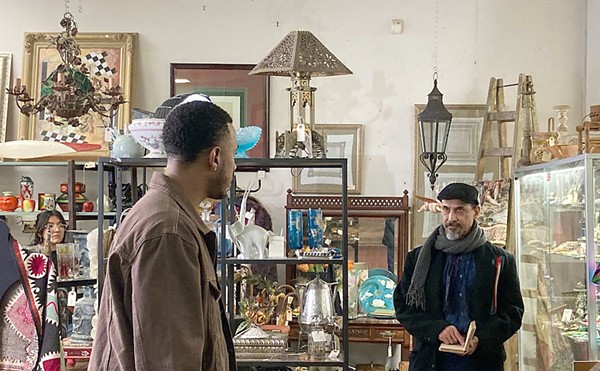Comic Felipe Esparza Brings Groundbreaking Specials Bad Decisions and Malas Decisiones to Netflix
By Kiko Martinez on Fri, Sep 11, 2020 at 10:00 am
As much as stand-up comedian Felipe Esparza likes to say the phrase “fuck you,” there’s no doubt in his mind that it’s funnier in Spanish.
“If I were to tell you, ‘Fuck you,’ I can’t really say it in a funny way,” Esparza, 44, told the Current during a phone interview late last month. “I can’t sing it in a song like, ‘Fuuuuuuck you!’ It just doesn’t sound funny! But if I were to say, ‘Chinga tu madre, güey!’ It just sounds funnier.”
Now, Esparza gets to test which language really is funnier with a pair of Netflix comedy specials released last week — Felipe Esparza: Bad Decisions and Felipe Esparza: Malas Decisiones. This marks the first time Netflix has simultaneously released two comedy specials by one comedian — one in English and one in Spanish.
During our interview, Esparza, who was born in Sinaloa, Mexico, and raised in Los Angeles, talked about how he prepared to perform an entire comedy special in Spanish and why it’s OK if audiences don’t laugh during the part of the specials where he jokes about the domestic abuse he experienced as a child.
In early July, you were the first comedian to postpone a show at the Laugh Out Loud Comedy Club citing COVID-19 as the reason. How did you come to that decision?
I was emailing some of the waitstaff from San Antonio because they’re my friends. They told me how bad things had gotten in San Antonio. My agent said, “I don’t know if you should go over there, man. Joe Rogan already canceled one of his shows.” I said, “Well, I better cancel my show, too, because I don’t have as much money as he does.”
Both the English and Spanish versions of your special are basically the same. The arrangement and some of the words you use are a little different. How did you decide which jokes would work in both languages and which would not?
I already had my one-hour [special] recorded in English. When I started working out the jokes in Spanish in San Diego, everything was working the way it was supposed to work. But once I crossed the border and performed in Tijuana, Mexico, some of the jokes did not cross over. The people who were bilingual got the jokes and laughed. Spanish speakers didn’t get it, so I had to do some arranging. A lot of the play on words I do in English, didn’t play well in Spanish, so I got rid of them.
Can you give me an example of something you had to cut from your Spanish special because it got lost in translation?
You know how you are talking to a girl and some other guy comes in and takes her from you? I had a joke where I used the slang word “cockblocked,” but I didn’t know how to say “cockblocked” in Spanish.
As a bilingual comedian who performs in English, how did you prepare yourself to do an entire set in Spanish?
When I started performing in Spanish, I started from the bottom. When I did Spanish shows in San Diego, I was the opener. I wasn’t headlining. I was opening for someone else who was gonna do an hour in Spanish. So, I got to know those [Spanish-speaking] comedians, and they became my friends. They told me about these comedy nights in Tijuana, so I started performing there twice a month.
During your specials, some of the stories you tell about the domestic violence you experienced as a child receive audible groans from the audience. Although there are punchlines to those jokes, I’m sure they can be uncomfortable for some people to hear. As a comedian, do you welcome those groans as much as laughs?
Those stories are personal to me. I had to get comfortable saying them. At first, I was too sentimental and agüitado (bummed out) and emotional because of those jokes. Once I got used to it, I didn’t care about the groans. It’s my experience and it [hurt] at the time. I think I was able to get over it because I kept adding things to the joke, so I could just keep going and take it to the next level. But you know, those jokes kill in Spanish. I think those jokes are funnier in Spanish than they are in English.
You’re known for not getting too political with your comedy. With the new specials, you touch on politics a bit when you poke fun of the slogan “Make America Great Again” by changing it to “Make America Great for Mexicans Again.” Can you expand on that idea since Election Day is only a couple of months away?
The president says Mexicans are taking jobs from Americans. I thought, “You know how funny it would be if a Mexican was saying that?” Like if there was an angry, conservative Mexican somewhere — like Archie Bunker in All in the Family but Mexican — who was complaining about the other immigrants who came in after him.
You mention in your specials that you have a white stepson named Miklo. I’m assuming that is a Blood In, Blood Out reference.
Yeah, his name isn’t really Miklo. He’s 15 now. I’ve known him since he was two years old, so I helped raise him. We look like Harry Potter and that fat guy.
Stay on top of San Antonio news and views. Sign up for our Weekly Headlines Newsletter.
“If I were to tell you, ‘Fuck you,’ I can’t really say it in a funny way,” Esparza, 44, told the Current during a phone interview late last month. “I can’t sing it in a song like, ‘Fuuuuuuck you!’ It just doesn’t sound funny! But if I were to say, ‘Chinga tu madre, güey!’ It just sounds funnier.”
Now, Esparza gets to test which language really is funnier with a pair of Netflix comedy specials released last week — Felipe Esparza: Bad Decisions and Felipe Esparza: Malas Decisiones. This marks the first time Netflix has simultaneously released two comedy specials by one comedian — one in English and one in Spanish.
During our interview, Esparza, who was born in Sinaloa, Mexico, and raised in Los Angeles, talked about how he prepared to perform an entire comedy special in Spanish and why it’s OK if audiences don’t laugh during the part of the specials where he jokes about the domestic abuse he experienced as a child.
In early July, you were the first comedian to postpone a show at the Laugh Out Loud Comedy Club citing COVID-19 as the reason. How did you come to that decision?
I was emailing some of the waitstaff from San Antonio because they’re my friends. They told me how bad things had gotten in San Antonio. My agent said, “I don’t know if you should go over there, man. Joe Rogan already canceled one of his shows.” I said, “Well, I better cancel my show, too, because I don’t have as much money as he does.”
Both the English and Spanish versions of your special are basically the same. The arrangement and some of the words you use are a little different. How did you decide which jokes would work in both languages and which would not?
I already had my one-hour [special] recorded in English. When I started working out the jokes in Spanish in San Diego, everything was working the way it was supposed to work. But once I crossed the border and performed in Tijuana, Mexico, some of the jokes did not cross over. The people who were bilingual got the jokes and laughed. Spanish speakers didn’t get it, so I had to do some arranging. A lot of the play on words I do in English, didn’t play well in Spanish, so I got rid of them.
Can you give me an example of something you had to cut from your Spanish special because it got lost in translation?
You know how you are talking to a girl and some other guy comes in and takes her from you? I had a joke where I used the slang word “cockblocked,” but I didn’t know how to say “cockblocked” in Spanish.
As a bilingual comedian who performs in English, how did you prepare yourself to do an entire set in Spanish?
When I started performing in Spanish, I started from the bottom. When I did Spanish shows in San Diego, I was the opener. I wasn’t headlining. I was opening for someone else who was gonna do an hour in Spanish. So, I got to know those [Spanish-speaking] comedians, and they became my friends. They told me about these comedy nights in Tijuana, so I started performing there twice a month.
During your specials, some of the stories you tell about the domestic violence you experienced as a child receive audible groans from the audience. Although there are punchlines to those jokes, I’m sure they can be uncomfortable for some people to hear. As a comedian, do you welcome those groans as much as laughs?
Those stories are personal to me. I had to get comfortable saying them. At first, I was too sentimental and agüitado (bummed out) and emotional because of those jokes. Once I got used to it, I didn’t care about the groans. It’s my experience and it [hurt] at the time. I think I was able to get over it because I kept adding things to the joke, so I could just keep going and take it to the next level. But you know, those jokes kill in Spanish. I think those jokes are funnier in Spanish than they are in English.
You’re known for not getting too political with your comedy. With the new specials, you touch on politics a bit when you poke fun of the slogan “Make America Great Again” by changing it to “Make America Great for Mexicans Again.” Can you expand on that idea since Election Day is only a couple of months away?
The president says Mexicans are taking jobs from Americans. I thought, “You know how funny it would be if a Mexican was saying that?” Like if there was an angry, conservative Mexican somewhere — like Archie Bunker in All in the Family but Mexican — who was complaining about the other immigrants who came in after him.
You mention in your specials that you have a white stepson named Miklo. I’m assuming that is a Blood In, Blood Out reference.
Yeah, his name isn’t really Miklo. He’s 15 now. I’ve known him since he was two years old, so I helped raise him. We look like Harry Potter and that fat guy.
Stay on top of San Antonio news and views. Sign up for our Weekly Headlines Newsletter.
Tags:

KEEP SA CURRENT!
Since 1986, the SA Current has served as the free, independent voice of San Antonio, and we want to keep it that way.
Becoming an SA Current Supporter for as little as $5 a month allows us to continue offering readers access to our coverage of local news, food, nightlife, events, and culture with no paywalls.
Scroll to read more Movie Reviews & News articles
About The Author
Newsletters
Join SA Current Newsletters
Subscribe now to get the latest news delivered right to your inbox.













